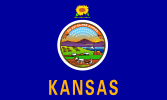Kansas Retirement

Kansas charges a state income tax, but gives residents a high individual deduction. Married couples filing jointly only have to pay income tax if their taxable income exceeds $30,000. Singles and married person filing separately only have to pay income tax if their taxable income exceeds $15,000.
Kansas only has three income tax rates: 3.5% for married couples filing jointly with $30,000-$60,000 in taxable income and singles with $15,000-$30,000 in taxable income, 6.25% for married couples filing jointly with more than $60,000 in taxable income and 6.45% for singles with more than $30,000 in taxable income. Some married couples filing jointly may have to pay the 6.45% rate.
Social Security benefits and Railroad Retirement are not taxable in Kansas as long you make less than $75,000 a year. The exemption for these benefits is based on the adjusted gross income on your federal tax return. Federal civil service retirement annuities are exempt from the Kansas state income tax. Most other retirement income including private pensions, annuities, and IRA withdrawals are taxable in Kansas.
You can claim all of the exemptions you take on your federal income tax return on your Kansas state tax return. This includes exemptions and standard federal exemptions.
» Speak to a Kansas Retirement Advisor for Free
Kansas State Sales Tax
The state of Kansas collects a 6.3% sales tax on all retail sales. There is no sales tax exemption for food in Kansas. In addition to the state sales tax, cities in Kansas can collect an additional 1% in sales taxes and counties can collect an additional 2% in sales taxes. That means the sales tax in Kansas can be as high as 9.3% in some areas.
If you are a Kansas resident you can apply for a Food Sales Tax Refund that would increase your state income tax refund. To get this refund you must be over 55 years old and make less than $30,000 a year. Persons who have a child or children under 18 living with them can also apply for this refund.
Kansas Property Tax
If you live in Kansas and own land you will have to pay property taxes to both your county government and the state. The state of Kansas collects a 1.5 mill levy on all property and a 20 mill for school districts. To determine your property tax rate you will have to contact the state and your county assessor. Most Kansas residents can research their property taxes online at this website.
A Homestead property tax refund for both renters and homeowners is available in Kansas. To qualify you must have been born before Jan. 1, 1955, and make less than $30,800 a year. If you are over 65 you could also qualify for a second refund called Safe Senior. If you qualify this refund entitles you to a refund of 45 percent of your property taxes. You must make less than $17,500 a year to qualify for Safe Senior.
Kansas also charges property taxes on vehicles. The amount of vehicle tax is based upon the age, type, registration, weight and value of your vehicle. Different counties charge different amounts of vehicle so the rate varies.

| Capital: | Topeka |
| Cost of Living Rank: | #7 |
| Sales Tax: | 5.3% |
| Income Tax: | 3.5% - 6.45% |
| State Website: | http://www.kansas.gov |